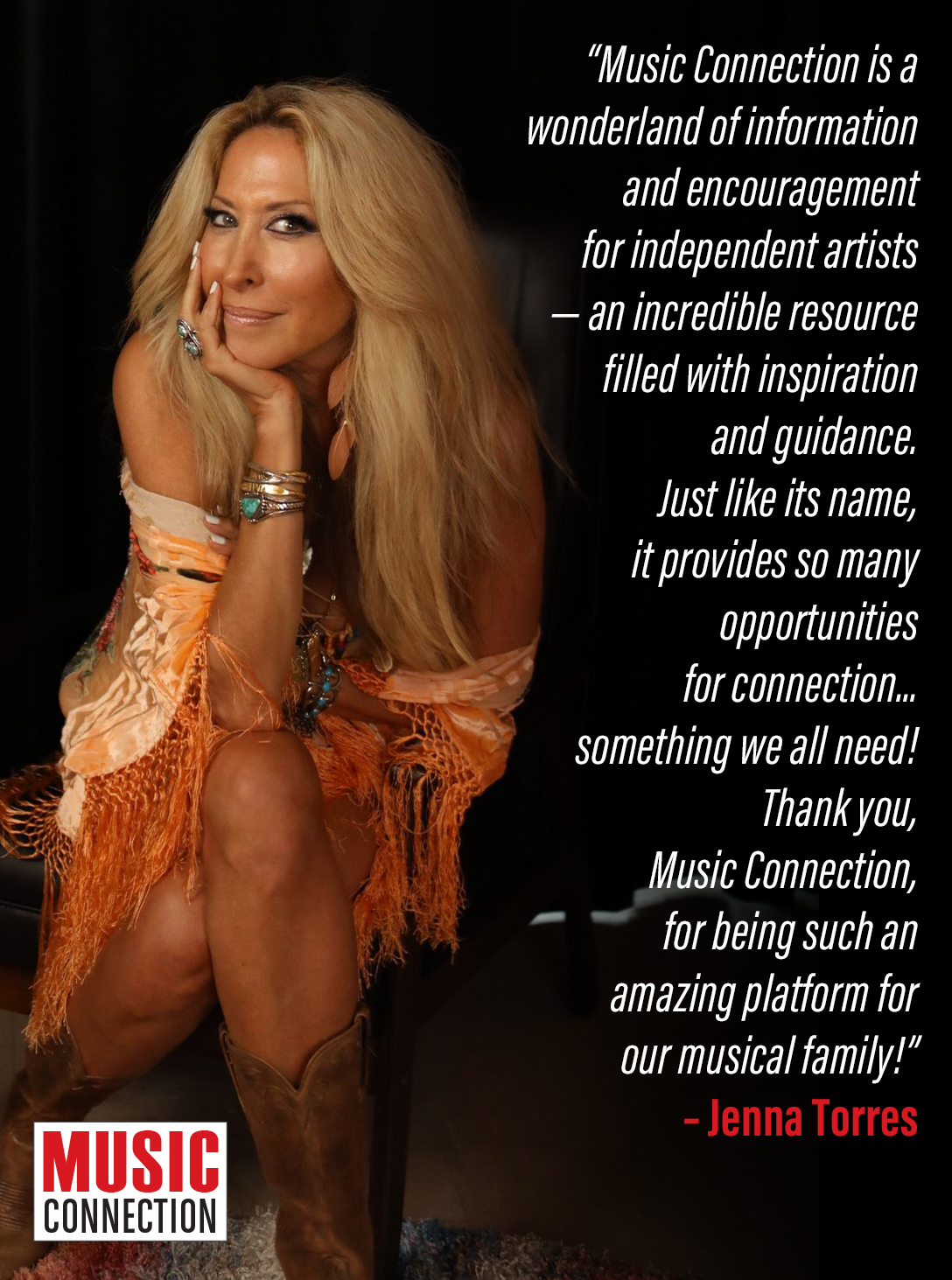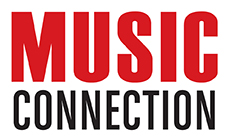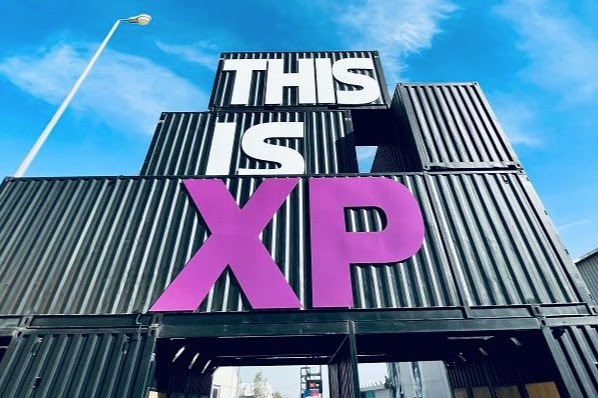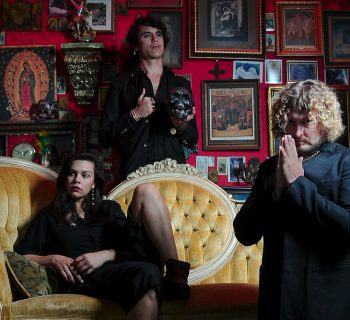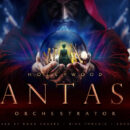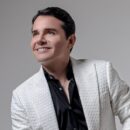Seventy-five is an auspicious age for any rock star—especially if you’re one who cavorts with snakes and gets your head chopped off every night on stage. Alice Cooper turned 75 in February, but the Rock and Roll Hall of Fame shock rock pioneer is still more active and working harder than artists a third of his age. He released a new studio album—Road, recorded with his regular touring band and longtime producer Bob Ezrin—at the end of August, following deluxe reissues of his Killer (1971) and School’s Out (1972) classics and a new mix of 1973’s chart-topping Billion Dollar Babies.
Cooper also came up with a new stage show he debuted at the end of April and has been on the road all year since, both on his own (including the Freaks on Parade 2023 tour with Rob Zombie and a support slot on Def Leppard and Mötley Crüe’s The World Tour) and with the Hollywood Vampires, the all-star collective with Johnny Depp and Aerosmith’s Joe Perry that launched during 2013.
Other projects he maintains include his Solid Rock Teen Centers in Phoenix, AZ where he resides, and Mesa, AZ and his “Nights With Alice Cooper” radio show that’s currently on hiatus due to an ownership change with his syndicator but that he hopes to bring back in the near future. And don’t be surprised when he pops up at a Comic Con near you. The road has been a long one, but Cooper is happy to keep it under his wheels for the foreseeable future...

Music Connection: Road is your 29th album. Do you still get excited about putting something new out?
Alice Cooper: Oh, yeah, absolutely. I never have gotten bored with the idea. A lot of people just go, “Well, why are you still going?” I go, “Look, I love writing songs. I love recording songs. I love making albums that are thematic albums. I love working with Bob Ezrin and all the great musicians we play with. And I love hearing it on the radio and going out and playing those songs in front of an audience.” I say, “That’s what I do. What am I gonna do—go home and play golf? I play golf anyway. I play golf in the morning and rock & roll all night.” So, no, there’s no thought of retirement here.
MC: As the Road song says, the dead don’t dance...
Cooper: (laughs) That’s right. Everybody is retiring now. This is gonna be the great rock & roll retirement year. I talked to Gene Simmons (of Kiss); we did a show with him in France and he says, “December, it’s over.” And you always go, “Yeah, yeah, that’s gonna go on forever” and he goes, “No, it’s over. December,” pretty vehement about the fact it’s gonna be no more Kiss live shows. And Aerosmith, same thing. Elton, the Eagles. So I’m gonna be the last band standing.
MC: It’s appropriate, then, that you have this new album that completely celebrates being on the road and really lays out why you love it.
Cooper: I see the fun in the road. I see the disasters. I see the humor. If you don’t know how to navigate the road, it’s gotta be awful. But I’m in a great situation; I finally maneuvered myself into a point where Sheryl is in the show, so I don’t have to leave her at home. And without her, the way our show runs, we can’t really do it without her. She does all the high vocals in both bands...
MC: And she cuts your head off every night.
Cooper: (laughs) Yeah, and that. So that’s one problem solved. I don’t have to leave home; I take home with me.
And secondly, I’ve got the best touring band out there and they’re all best friends and I never hear anybody griping about, “Oh, I don’t get enough solos,” stuff like that. Everybody in that band cares about the show as much as I do.
So all the ducks are in a row and all we’re doing is having fun out there. It does get a little bit exhausting, the travel, but you just have to put your mindset into the fact that for the next four months we’re gonna be living in and out of a suitcase, in a hotel, on a bus, in an airplane—”Alright. Great. It’s gonna be fun!”
MC: What led you to make Road this way, with the road band?
Cooper: I felt this was the way I can show this band off. I went to Bob Ezrin, I said, “I want to do an album with my live band,” and honestly I haven’t done that since The Eyes of Alice Cooper (in 2003). That was the only other time. We would write the song in the morning, rehearse in the afternoon and record it that night, live in the studio, and I think you could tell. There was a freshness to it. It didn’t have time to get old. Same thing with his. They brought the songs in; I said, “I want everybody to write songs about the road. I don’t care what the concept is, as long as it’s about the road, some angle about the road, and then Bob and I will do surgery on it and we’ll turn it into what we want it to be for this album.” And that’s what happened.
MC: Sort of like giving the inmates the keys, or some of the keys, to the asylum.
Cooper: Exactly. Everybody brought songs in and Bob and I just kind of took off in the studio and started constructing them the way we wanted them to be, then we brought it back and the band would come in and play it live in the studio.
I said, “I want you to play it live, every bed track is gonna be live” and then we would just pick the best bed track and I’d put the vocal on. It really shows how good the band is, to take a brand new song, play it live and make it sound like they’ve been playing it for years.
I like the freshness of it. If it speeds up a little bit, if it goes a little bit left or right, as long as the feel of that song is great, that’s what I care about. I don’t want to make a perfect album.
MC: The opening track, “I’m Alice,” sounds like your next show opener.
Cooper: It has to be. When I got done with that song, Bob and I looked at each other and went, “Opener!” And that’s Alice again, exaggerating, talking about himself. I’m not talking about me; I’m talking about Alice talking about himself, and of course he’s an overblown, egotistical, condescending villain—so of course he’s talking about how wonderful he is. I think that’s just part of it; Alice is talking about, “Okay, here’s the album. It’s all about me. It’s all about the road, and here we go!”
MC: A few of the songs address Alice as this hated character, the pariah you were, or he was, back in the ‘70s when you started out. That’s not really the case anymore, though.
Cooper: I think that there’s still a smattering of people out there that don’t get it. There are people that are so out there they get Ozzy (Osbourne) and myself and Kiss and Rob Zombie confused. One day a guy walked up and said, “Oh, man, I thought it was so cool when I saw you bite the head off a bat,” and I go, “That was Ozzy.” They put us all into one little place and they think we’re all the same guy somehow. But I want the Alice Cooper character to still have that danger involved, to still have that certain amount of villain involved. So, yeah, I paint him that way on the album.
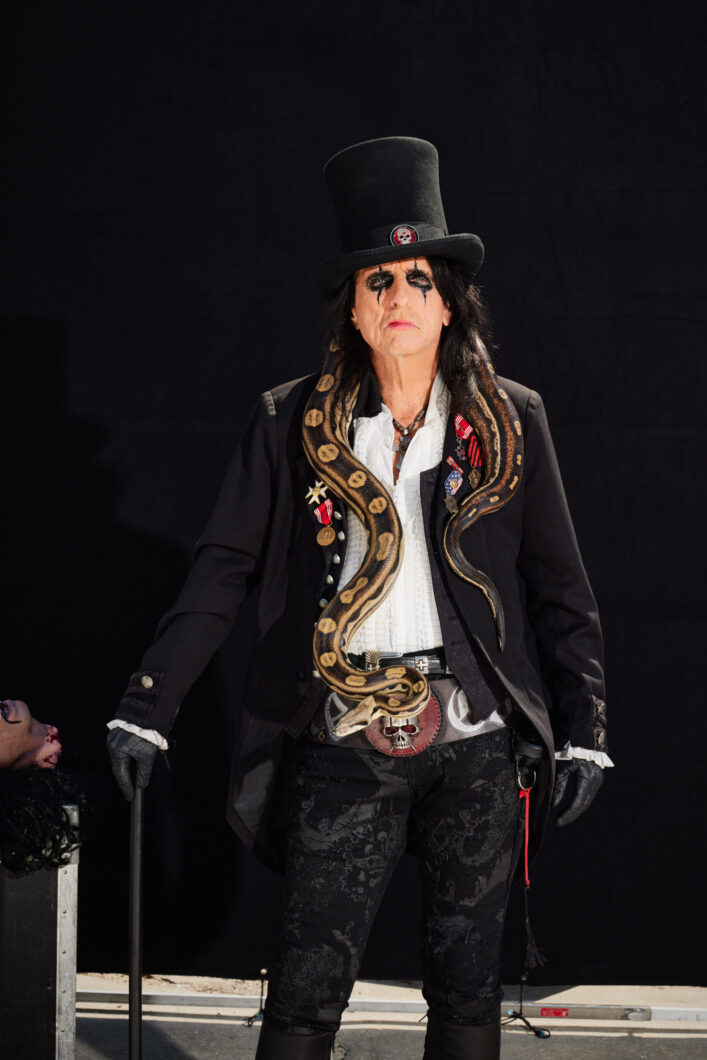
MC: There are some other great and archetypal characters on this album. “White Line Frankenstein,” for instance.
Cooper: I know guys like that in both Europe and in America—truck drivers, bus drivers. When they’re done with our tour they go right to another tour and I’m going, “So, you basically live in the cab of this truck? This is, like, your world?” I take each character as they come along and exaggerate them, so now I’ve got this guy who lives in his truck—he’s a White Line Frankenstein. All he sees is white lines all day on the highway, and there’s probably white lines in other places in his life. But he is the king of that cab. He’s the Frankenstein of that cab, and he loves it.
MC: “Go Away” seems like a timeless tale of the rock & roll road.
Cooper: It’s one of those things where every guy, I think, in his career has had that one girl that obsesses and cannot give you up and will go to space to find you, or go to the Bermuda Triangle to find you. I think everybody’s had one or two characters like that in their life. I just said, “Yeah, that’s a common denominator with most rock guys to find that one somebody who’s so obsessed, and that (song) is a funny way of talking about it—”Could you please just go away?”
MC: You preceded Road this year with deluxe reissues of the Killer and School’s Out albums as well as a new Quadio mix of Billion Dollar Babies. What’s it like having your past and present coexist in the marketplace like that?
Cooper: Those (reissues) never affect me. I never, ever think about them. They just happen. It doesn’t affect the show. It doesn’t affect the new album. Every day somebody comes up to me and says, “Hey, it’s the 64th anniversary of Lace and Whiskey” and I go, “That’s nice.” I honestly can’t keep up with any of that stuff. As much as I enjoy the history of Alice, I just don’t live there. People remind me all the time of anniversaries and this and that, and I do appreciate it. I understand how the fans, especially the collectors, love those things. But I don’t live in the past.
MC: Let’s ask you to, for just a second, though. Muscle of Love, the final album with the original Alice Cooper band, turns 50 in November. What’s your 2023 perspective on it?
Cooper: There were a lot of great songs on that album, but it wasn’t cohesive. The album didn’t feel like it was locked together by one idea; and as much as the production is great on it and everything like that, it still missed the Bob Ezrin cohesiveness. The band didn’t want to work with Ezrin, but I did. I was the one going, “No, we gotta stay with Ezrin.” Like I said, (Jack Richardson and Jack Douglas) did a great job on production. The album sounded great. I just felt there was something missing in it that (Ezrin) would usually get out of us. But, I mean, I listened to “Man With the Golden Gun” the other day, and I listened to Teenage Lament ‘74. There were some really good songs on that album. I just felt like we were sort of reaching for straws there.
MC: That was the second album you released that year. What a different time that was.
Cooper: But it was that era where that’s what you did. You did an album and then you’d tour and then while you were touring you were writing the next album, and then as soon as that tour was over you went in the studio and did an album. And then you toured again. In fact, there was a period of time where if you were to say to me, “I want to send you this” I’d go, “I don’t live anywhere. Send it to the next Holiday Inn,” because we didn’t really live anywhere for a long period of time. It was just touring and recording.
MC: What wisdom do you have now that you’d impart on those guys if you could time travel back to 1973?
Cooper: Y’know, you’re bulletproof at that point. You don’t mind that you just did 64 cities in 72 days. As long as there was beer, we were fine. It’s the most exciting time of your life; not only are you out there on stage doing this kind of show, but it’s successful and people are paying you, which is something we weren’t used to. I could tell them whatever, but they wouldn’t listen. (laughs)
MC: You put together a new show this year, which is always notable.
Cooper: We had the Haunted Castle for a couple of years, which was really a lot of fun to do. That was sort of like what my Friday night horror movie would look like if I had a Friday night horror movie. But this show is totally different. Like anything else, we have to do the hits; the audience wants to hear the hits, so it’s how do you decorate those hits? How do you put them into a storm form or some kind of new way of looking at the show? So, we added some new things and really made use of video technology more than we ever have before.
Like, when Alice does “The Ballad of Dwight Fry,” you can see all the facial things he’s doing, right up close. We just kind of got tired of people not being able to see some of the real intricate parts and details, so we made that a real focus this time out.
MC: How hard is it to put a set list together every time you go out?
Cooper: It happens while you’re doing it, really. We take a set list into rehearsals and it’ll change seven or eight times—”Ah, that song doesn’t go into that song right. Let’s put this song in there,” that kind of thing. It’s putting a puzzle together, really, just connecting the dots in the right way. But I’ve got people who have done this for 50 years. Sheryl and I have been putting a show together like this forever. And musically my (band) can learn a song in an hour, any song, so we’re not crippled in any way.
MC: Something else exciting this year was having “I’m Always Chasing Rainbows” from Alice Cooper Goes to Hell (1976) show up on the Guardians of the Galaxy Vol. 3 soundtrack.
Cooper: Y’know, I was at the new Ant Man movie and Michael Douglas and Catherine (Zeta-Jones) were there. They said, “You gotta come down to the premiere, so we went down and there was a guy from Marvel and he was a big Alice Cooper fan and he says, “I’ve got one of your songs in the new (Guardians of the Galaxy) movie.” I said, “Really?!” I didn’t even know about it, but I’m a big fan of the Guardians of the Galaxy. I think they’re really funny. It’s what Marvel should do. It’s all that action, all that great CGI stuff, with a sense of humor.
MC: How did it feel to have the Hollywood Vampires back in action this year?
Cooper: I’ll tell you what; the band is as tight as I’ve ever heard it. The band is really, really good now. We’ve had enough time off, so everybody’s ready to get back out there on the road.
It’s funny, ‘cause I hadn’t seen Johnny in three and a half years because of the Covid thing, and he was playing with Jeff Beck here in Phoenix. So I went backstage and I opened his door and went, “So...what’s new? Did I see you on TV or something?” (laughs) We were laughing ‘cause of the whole Amber (Heard) thing. I said, “I have either the best idea or the worst idea I’ve ever heard in my life.” He goes, “What?” I go, “You and Amber do a remake of War of the Roses,” and he started laughing, and then he kinda went, “Not a bad idea...” I mean, who wouldn’t want to see that? The press for it is just built-in, you don’t even have to push it. Just let it happen and report on it.
MC: The group put out a live album (Live in Rio) earlier this year. What are the prospects for new Vampires music?
Cooper: We haven’t had time, really, any chance to record anything new. We had a lot of live tapes, and this band is great live. We were surprised that the Wembley show was voted the best show of the year at Wembley, which had a lot to do with the fact the band was really good and tight and unique, so we were really proud of that. It’s basically a bar band, but it puts out a really good vibe, a really fun vibe on stage and yet it’s still a little dark. But in the end people are just having a great time, ‘cause all the songs that are being played are songs everybody wants to hear.
MC: You’re working on some other new music too, right?
Cooper: Well, I can’t talk about that one too much, but let’s just put it this way—it’s historic and at the same time really kind of quirky. Sometimes you’re working and you go, “Really? Okay, let’s go with that and see what happens.” So, that one will be really cool. What I like is it’s a very creative time now. We put a new show together this year—that’s always the most creative time you can have—and there’s a lot of laughing and a lot of “Let’s try this” and it doesn’t work and all of a sudden something works that you’re never expecting to work... That’s really why I do this, for the creativity and these adventures we’re having. There’s so many of them now; it’s really inspiring.
Contact Zoe Hines, [email protected]
Photos by Jenny Rischer
Cooper & Crüe
By all rights, Alice Cooper should have cut the heads off the founding members of Mötley Crüe during the past couple of years.
The shock rocker—who, of course, has his own noggin lopped off every night of his own concerts—served as the special guest for nearly the entirety of the Crüe’s Final Tour during 2014-15. On Jan. 28, 2014 announcing the trek the four Crüe members—Nikki Sixx, Vince Neil, Mick Mars and Tommy Lee—signed a binding Cessation of Touring Agreement preventing them from going on the road again under the band name.
And part of the punishment for breaking the deal was a trip directly to Cooper’s guillotine.
Flash forward to 2019 and Mötley Crüe, fresh off the success of the Netflix film adaptation of its band biography The Dirt, decides to reunite for The Stadium Tour, co-headlining with Def Leppard. The Covid-19 pandemic delayed the outing until the summer of 2022, but Mötley was nevertheless back on the “Wild Side.”
“We did that Final Tour and that’s it, and then, of course, when they came back out I went, ‘Okay, so I’m the big liar,’” Cooper says now. “But I laughed about it, and their explanation was, ‘We’re Mötley Crüe, man. We don’t believe in contracts.’ And I said, ‘That’s so perfectly rock & roll, and so perfectly Mötley Crüe.’”
By accounts, the Cessation of Touring Agreement was able to be set aside if all four of the signees decided to play together again. That ultimately resulted in more drama, of course; after the 2022 leg guitarist Mars, who’d long suffered with ankylosing spondylitis, a form of arthritis, since he was 17, retired from touring but with the intent of remaining in the band. The Crüe, however, hired John 5 as his full-time replacement, setting off dueling lawsuits.
The current Crüe, meanwhile, made good to Cooper by having him open the six U.S. dates on The World Tour, a continuation of The Stadium Tour. “They said, ‘It’s gonna be Mötley, Def and you,’ and I said, ‘That’s fine,’” explains Cooper, who did the dates alongside his continuing Too Close For Comfort Tour. “I don’t care when we go on. We’re gonna do our show no matter what. I’m past the ego thing of, ‘We have to go on last!,’ that whole thing. We’re gonna do our show, I don’t care what slot we’re in.
“Tommy Lee recently said that the worst thing you can ever do is have Alice open for you. I thought that was great, a nice compliment.”
